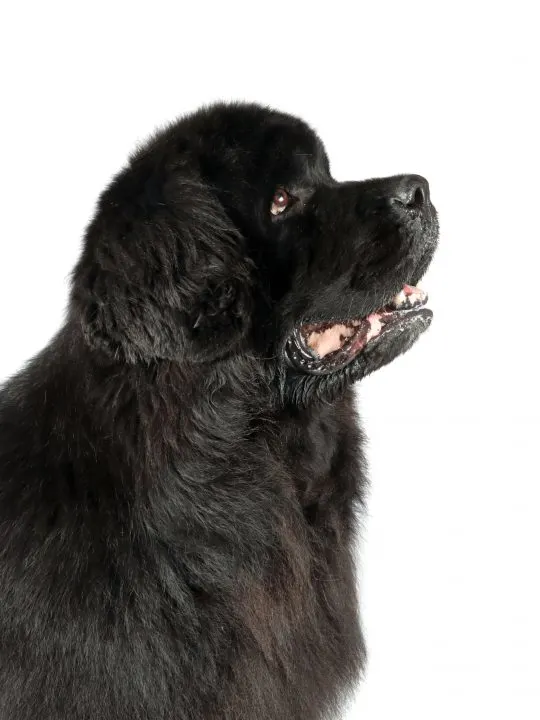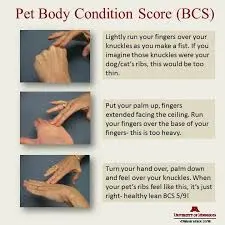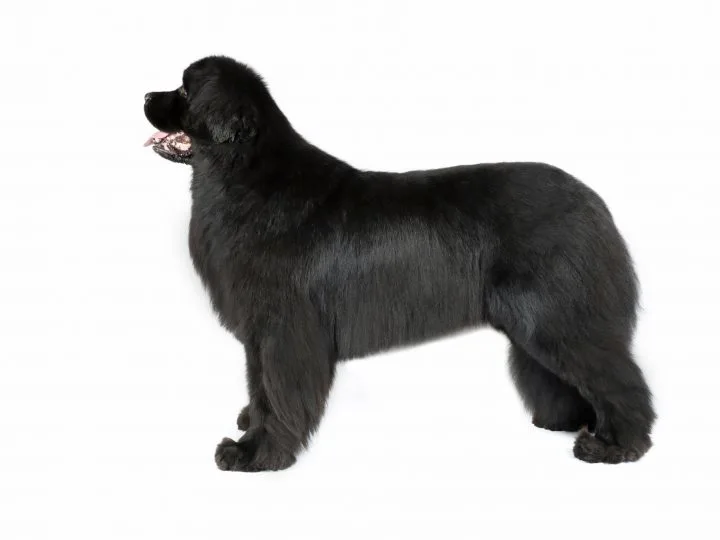Obesity is one of the most common medical conditions seen in dogs and it’s actually considered an epidemic.
A fat Newfie is not a healthy Newfie so it’s super important to be aware of the risks associated with having an overweight Newfoundland.
Today we’re going to go over some common reasons why a Newfie might be overweight, how to tell if your Newfoundland is overweight and how you can get them back on track to a healthy lifestyle.
But before we get to that, I want to make a confession:
Odin was overweight.
If you remember, Odin came to us slightly underweight.
He wasn’t too skinny but he could use a few extra pounds on his frame.
The first 2 years went fine but this past year, he really gained some weight.
I kept brushing it off saying it was just his thick coat but it wasn’t.
I noticed that I could no longer feel his ribs and that he was also getting winded quicker.
He also had a limping episode and that was my wake-up call and I took action.
Is It Dangerous for Your Newfoundland to Be Overweight?
Absolutely.
Obesity in dogs should not be taken as lightly as many owners believe.
Our Newfies already have a short lifespan of about 10-12 years so why would we want to make it even shorter by contributing to their health problems?
Extra pounds can lead to serious complications for your Newfoundland.
Some health problems that are often linked to overweight Newfies are:
Arthritis
Newfoundlands are already prone to arthritis and hip dysplasia due to their massive size and fast growth.
Extra weight only makes these conditions worse and may contribute to arthritis taking hold too soon.
If your Newfie already has a joint disease, carrying around extra weight can increase their pain.
Besides arthritis in the knees and hips, Newfies can also experience arthritis in their neck and back.

Heart and lung issues
Obesity in dogs is linked to a whole list of medical conditions such as heart disease, high blood pressure, and respiratory disorders.
If these conditions are left untreated, it can result in serious complications for your Newfie.
Anesthesia risks
Newfies are big dogs that are actually known to be sensitive to certain anesthesia.
Being obese already is putting a strain on a dog’s heart and lungs and when they go under the already stressed heart and lungs will have to work even harder.
Cruciate tears
A cruciate tear is one of the most common injuries seen a giant breeds like the Newfoundland.
Extra weight puts extra strain on this ligament and often leads to a tear.
Keeping your Newfie at their ideal weight decreases their chance of tearing this ligament.

Stress on the body
Just like in humans, a large amount of fat distributed throughout the body can put a strain on several body processes.
An overweight Newfie can experience heart problems, respiratory problems, joint and muscle injuries, laryngeal collapse and heatstroke.
Quality of life
Plain and simple, being overweight can decrease your dog’s quality of life.
Obesity can also take up to 3 years of your Newie’s life!
Though all of the possible issues listed above should be enough incentive to keep your Newfoundland at a healthy weight, another factor to consider is their overall well-being.
Obesity can make each day challenging, it may be harder to get up in the morning, and it could lead to daily pain.
Keeping them slim is not only important for your Newfie’s health but also for their happiness.

How To Tell If Your Newfoundland Is Overweight
The average weight range for a male Newfoudland is 130-150 pounds.
The average weight range for female Newfie is 100-120 pounds.
However, these are just average ranges and body type should also be taken into consideration.
But without a professional dog scale in our home, it’s hard to notice if they’ve put on a few extra pounds, however, there are some easy ways that you can assess their body weight and body condition at home.
Do the rib test
You should always be able to feel each of your Newfie’s ribs without a layer of fat covering them.
Check their waist
This can sometimes be hard to do with a Newfie’s thick coat but they should have somewhat of a waist. When standing above them (us short girls might need to stand on a chair) look down on their back. You should be able to see a slight definition between the top half of their body and their waste.
When looking at them from the side, you should see a dip from their chest leading down to their abdomen, meaning their “belly” should not hang as low as their chest when standing.

- Newfies pant a lot because they are warm but they shouldn’t pant because they are winded walking around your house. If you’re Newfie is easily getting out of breath by just moving around the house or yard, they could be overweight.
- If your Newfie normally goes for daily walks and is not interested anymore, it could be because they are feeling sluggish from all the extra pounds they are carrying around. Also, consider their weight gain if they become winded easily during playtime.
What Can Cause A Newfoundland To Gain Weight?
Newfies normally don’t just gain weight to gain weight.
There will almost always be a reason behind your dog’s weight gain.
Some of the more common reasons Newfoundlands gain weight are:
Overeating
The most common reason behind weight gain in Newfies is overeating.
This is usually due to being overfed by their owners. Newfies don’t require 10 cups of food a day, in fact, most adult Newfies eat on average about 4-5 cups per day.
These meals are broken down into 2 feedings but the amount being fed greatly depends on the weight and activity of the Newfie.
It also depends on what type of food you are feeding and how many fat and calories it contains.
You should also be feeding what your Newf should weigh, not how much they currently weigh.
If you free feed, consider switching to feeding a set amount at a set time. It’s been said that feed feeding encourages dogs to become picky eaters which can lead to obesity.
Also keep in mind that if you feed kibble, most bags of kibble display the amount of food an intact dog should be eating.
That amount can and should be reduced if your Newf is spayed or neutered.
If you need to cut back on kibble, do it slowly and try to add low-fat veggies like green beans.

Too many treats
I’ll be the first to admit that I’m guilty of this one.
Treats equal calories and extra calories can equal weight gain.
If your Newfie demands treats throughout the day, try to offer treats that are lower in fat or substitute their dog treats for dog-safe veggies or fruits.
Eating human food
Newfies are beggars, plain and simple.
I can’t sit down for a snack without 2 big Newfie heads staring at me with their pathetic brown eyes.
The best way to stop giving your Newfie food from your plate is to discourage begging.
If that isn’t an option and you must give in, make sure to adjust their feedings accordingly.
Lack of exercise
If you let a Newfie lounge on the couch all day, they will.
One of the most common mistakes we make as Newfie owners is to let our dogs become couch potatoes.
You don’t want a lazy Newfie, you want them to move as much as they can for as long as they.
Not only will daily exercise help them to burn calories but it will also keep their joints moving.
Swimming, walking, nose work, hiking and draft work are all good ways to keep your Newfoundland moving.
Spaying/neutering
It’s been said that spaying and neutering can result in a slow metabolism and it’s super easy for dogs to pack on some few extra pounds after they’ve been altered.
You should always speak to your vet or breeder if you have any questions about weight gain after spay or neuter surgery.
Fluid Retention
While not as common as the issues listed above, retained fluid that is not diagnosed can also cause weight gain.
Back when Leroy was really sick with IBD he was leaking protein into his body which was causing pitting edema.
You could see the edema in his back legs which was misdiagnosed as an allergic reaction.
You could not see the fluid that was accumulating around his abdomen and heart.
Medical Conditions That Can Contribute To Weight Gain In Newfies
While the above factors are some of the most common reasons behind a Newfoundland’s weight gain, there are a few medical conditions that can lead to obesity especially in this breed.
Hypothyroidism
Hypothyroidism is a common medical issue in Newfies. This condition means that a dog has an under-active thyroid gland. This condition not only can contribute to weight gain but can also cause hair loss, decreased energy, and more.
Genetics
Some breeds are at a higher risk of obesity than others. With the Newfoundland being prone to weight gain and joint disease, it’s even more important to watch their weight closely throughout their life.
Fluid Retention
While not as common as the issues listed above, retained fluid that is not diagnosed can also cause weight gain. Back when Leroy was really sick with IBD he was leaking protein into his body which was causing pitting edema. You could see the edema in his back legs which was misdiagnosed as an allergic reaction. You could not see the fluid that was accumulating around his abdomen and heart. All this extra fluid he was carrying around added several pounds to his weight.
Other medical conditions that can cause weight gain in dogs are Cushings disease, parasites and some medications like Prednisone.
How Can You Help Your Newfie Lose Weight?
If you find yourself in the position where your Newfie needs to lose weight, don’t worry. There are several steps you can take to get the extra pounds off.
It’s important to keep in mind that the weight loss will take some time so don’t rush it.
You want your Newfie to safely lose weight so that they don’t experience any other medical conditions in the process.
Some ways to help your Newfie lose weight include:
- First, it’s important to rule out any medical conditions so make sure to have your Newfie examined by a veterinarian. Your veterinarian might suggest having bloodwork done to rule out medical problems such as hypothyroidism.
- Speak to your veterinarian or breeder about switching your dog to a lower calories dog food or gradually adjust the amount of food that you’re currently feeding.
- Start an exercise routine. You can start by walking and slowly increasing the distance you walk each day.
- Take your Newfie swimming. Swimming is a great low-impact exercise for all dogs!

- Set up an agility course in your yard. You don’t have to do anything fancy. Just buy some cones and set up a little course!
- Keep track of your Newfie’s weight on a monthly schedule. You can weigh your Newfie at the vet office or some pet stores might have a dog scale that you can use. If you have some extra money to spare, you can also purchase your own dog scale.
- Start cutting back on those treats! Treats are going to be a big factor in getting your Newfie to lose weight so gradually start to cut back on those. If you stuff Kongs or Toppls to keep your Newfie busy, those are adding extra calories to the dog’s diet. Make sure to adjust their meals accordingly and try to keep the food that you use in canine enrichment toys, low-fat and low-calorie. Some examples would be canned pumpkin, fat-free plain Greek yogurt and even pureed fruits and veggies.
- Make sure everyone in the house is on board. Everyone in the family has to be a part of your Newfie’s weight loss journey. You can’t have someone sneaking treats to them when you’re away so make sure they are all committed to helping your Newfie too.
- Don’t get discouraged! It’s a lot harder to take the weight off than it is to put it on!
When Should You Take Your Newfie To The Vet?
Your veterinarian should always be a part of your Newfie’s health care and that includes their diet.
Make sure you communicate with your vet that you adjusting their diet and always be willing to reach out to your vet with any questions or concerns.
If at any time your Newfie starts vomiting, has diarrhea or stops eating you should contact your vet.
And if you’re doing everything you can to get your Newfie to lose weight but they’re not, ask your veterinarian about doing a thyroid panel.
Final Thoughts
You’re not a bad Newfie owner if your Newf is overweight, it happens to a lot of us. The important thing is to accept the fact that they’re overweight and take steps to remove those extra pounds before it’s too late.
For Odin, I changed his food to a lower-calorie food, decreased his treat intake, increased walks, and I plan on having his thyroid levels checked at his yearly checkup.
An overweight Newfie is not a healthy Newfie and not only could be subtracting years off their life but it can also lead to added stress on their joints and heart.
And hey, you’re not a bad owner if your Newfie is overweight.
Many of us have been there or we’re there now.
The important thing is that you start taking steps to help them get back to a healthy weight.